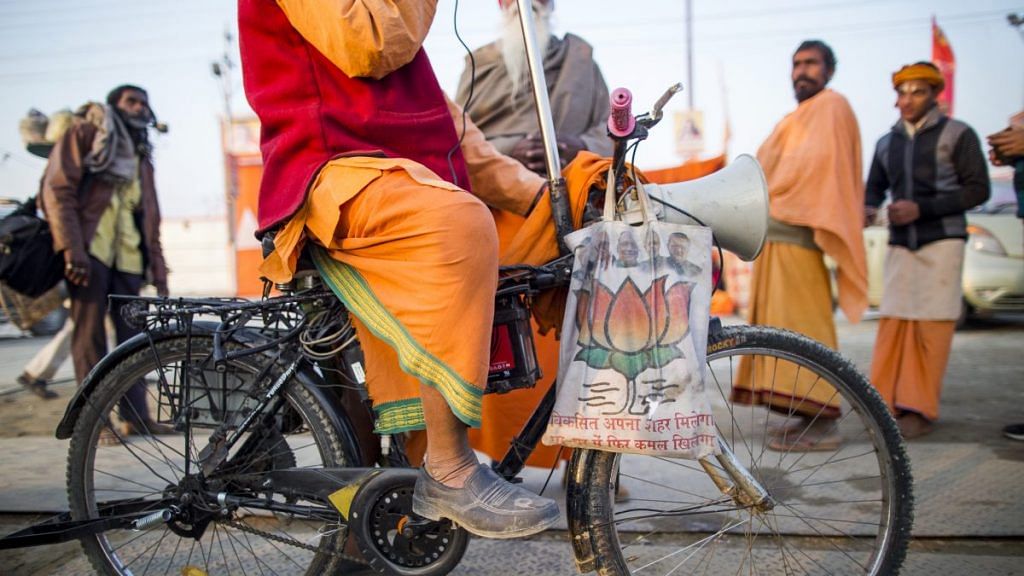India owes its continuation as a benign soft power in the world today to its commitment to the philosophy of vasudhaiva kutumbakam – the world is one family – and sarvepi santu sukhinah sarve santu niramaya – may everyone be happy and healthy. Significantly, this philosophy also forms the basic tenets of the idea of ‘Hindu Rashtra’, which Rashtriya Swayamsevak Sangh (RSS) chief Mohan Bhagwat recently described India as being one. “As long as even one person calls himself a Hindu, (India) will remain a Hindu nation,” Bhagwat said at the release of a book, The RSS: Roadmaps for 21st century, Tuesday.
For some so-called Indian ‘liberals’ fuming over the RSS chief’s remark, the possibility of understanding what the term ‘Hindu Rashtra’ means is remote.
The RSS and its leadership have over the years clarified that the idea of ‘Hindu Rashtra’ is in no way similar to a theocratic state presided over and run on the diktats of a religious body as in the case of countries following Islamic or Christian faith. This is because Hindus are not a sectarian class. And Hinduism continues to adhere to the conglomeration of universal values that form its nucleus, often referred to as dharma.
The world recognises this aspect about India. It can look at India’s history and see that the country has never been a theocratic state, presided over by a religious authority.
Also read: Indian liberals don’t get the difference between Hindu State & Mohan Bhagwat’s Hindu Rashtra
Hindu Rashtra and Hinduism
It would be prudent to understand the unique concept of ‘Hindu Rashtra’ from a broader perspective rather than dissect Mohan Bhagwat’s statements through the narrow prism of current political situation. ‘Hindu Rashtra’ is the manifestation of what is essentially the hallmark of Hinduism: unity in diversity, that distinctive feature of India and its people that is acknowledged world over.
The cohesion between Hinduism, a way of life absorbing the principle of ‘unity in diversity’ coexisting with dynamic social, and political structures forms the very basis of a chequered history of this ancient civilisation. From ancient period to modern times, “Hindu” India’s social, political and economic engagement with Asia and South East Asia and other countries in the region has been uninterrupted and free of its moorings in “Hindutva”, loosely referred to as Hindu Desam, merely another name for Hindu Rashtra.
The present volley of criticism over Mohan Bhagwat’s statement seems more out of vote bank considerations than sincere ideological differences. It is not only unfortunate but intellectual dishonesty to link issues like lynching and cow vigilantism by fringe elements with the ideals of Hindutva and Hindu Rashtra. In spite of repeated assertions by RSS leaders and, more importantly, demonstrated by collective social behaviour, politically motivated critics have painted Hindu as communal and anything non-Hindu as secular.
It is important to note that the RSS does not consider itself as yet another ‘organisation in the society’ but believes in ‘organisation of the society’. Just as Hindu includes every shade of faith, method of worship, caste, community, and creed, thus merging subordinate identities into a larger national identity, so does Hindu Rashtra that represents a larger civilisational national entity.
Also read: Why Gandhi and Ambedkar never engaged with Hedgewar, the founder of RSS
Not an RSS creation
Founded in 1925 amid the thick of freedom struggle, the RSS shakhas have been saying in their daily prayer that ‘we are part and parcel of Hindu Rashtra’ (vayam Hindu Rashtra angabhoota). The RSS did not create Hindu Rashtra nor did it invent Hindutva. The RSS chief, too, has made this clear in his recent speech.
The RSS has consistently held that the concept of Hindu Rashtra should not be confused with that of religion or theocracy. Hindutva, according to the RSS, is a cultural idea and does not confine itself to the narrow definition of religion or even a particular method of worship or faith. Hindu Rashtra, therefore, cannot be converse of or opposed to democracy but is representative of the ethos, culture, philosophy and the way of life of the people inhabiting the cradle of all these ideals, which is India that is Bharat.
“The Sangh (RSS) works towards universal brotherhood and the cardinal principle of this brotherhood is unity in diversity. This thought comes from our culture, which the world calls Hindutva. That is why we call it a Hindu Rashtra,” Bhagwat had explained while speaking at the three-day lecture series held in Delhi in September 2018.
The RSS, which will observe the centenary of its formation in 2025, is here to stay. It has played and will continue to play a seminal role in shaping the future of this country and the people. The critics of the RSS and its viewpoint would do well to be responsible and sharpen their criticism with intellectual honesty rather than political duplicity.
But the RSS has a greater responsibility to reach out to a larger segment of the people with a view to form national consensus on issues that are germane to our identity as a nation.
The author is a member of the National Executive Committee of the BJP and former editor of Organiser. Views are personal.
